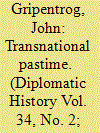| Srl | Item |
| 1 |
ID:
105214


|
|
|
|
|
| Publication |
2011.
|
| Summary/Abstract |
Herbert Hoover is often portrayed as a business-centric relatively non-political historical figure. In particular during his time as Commerce Secretary in the administrations of Warren Harding and Calvin Coolidge, Hoover is often described as supporting a United States foreign policy that first and foremost served the needs of American corporations. This article attempts to recalibrate that picture by stressing Hoover's political self-interest as a motivating factor in his policies. Far from being politically unconcerned, Hoover was a man desperate to become president of the United States. His disastrous campaign for the Republican nomination in 1920 made him doubly determined to use his power in the Republican cabinets to improve his chances for the nomination later. This can be seen in one of the most famous of Hoover's foreign policy interventions, the Anglo-American rubber crisis. Far from serving the needs of American business, during this crisis Hoover was acting mostly from political self-interest. In particular attacking the British allowed him to reframe his image, which was seen as Anglophiliac in 1920. In the end it was a very successful rebranding, as Hoover was able to run for the presidency in 1928 from a position of strength when it came to foreign affairs.
|
|
|
|
|
|
|
|
|
|
|
|
|
|
|
|
| 2 |
ID:
095525


|
|
|
|
|
| Publication |
2010.
|
| Summary/Abstract |
On September 18, 1931, Japanese troops bombed a section of the Japanese-operated South Manchurian Railway outside the city of Mukden, blamed it on Chinese troops, and then used the manufactured incident as a pretext to conquer all of Manchuria.1 Within a year Japan formalized its territorial aggrandizement by "recognizing" the puppet state of Manchukuo. The Japanese advance in Manchuria was an epochal moment in world history, widely regarded as the first salvo of World War II. Historian David Kennedy asserts, for example, "On the wind-scoured plains of Manchuria, Japan . . . set the match . . . to the long fuse that would detonate the attack on Pearl Harbor just ten years later." Japanese scholar Saburo Ienaga similarly states, "The Pacific War began with the invasion of China in 1931," adding that events at the time "are inseparable, all part of the same war." Walter LaFeber meanwhile writes in his survey of U.S.-Japan relations that "World War II's roots ran back to September 1931, when the Kwantung Army struck to place all Manchuria under Japanese control."2 In logical accordance with this interpretation, some historians claim U.S.-Japan relations soured irreconcilably in the aftermath of Japanese aggression. "From this time on," writes Paul Schroeder, "the United States was to grow steadily more suspicious and hostile, until she finally stood militantly opposed to Japan's aggressive expansion." Another scholar adds that Japan's popularity among the American public "declined rapidly" following events in Manchuria.
|
|
|
|
|
|
|
|
|
|
|
|
|
|
|
|